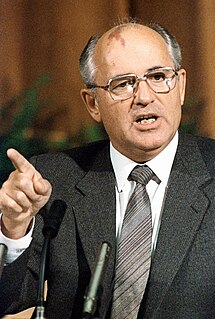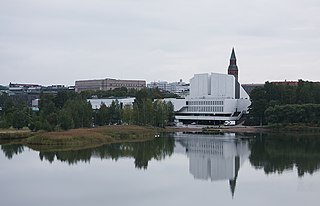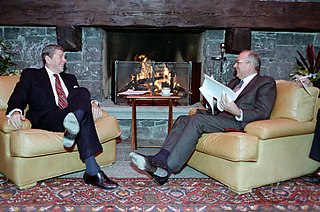| |||||
| Decades: | |||||
|---|---|---|---|---|---|
| See also: | |||||
Events from the year 1990 in Finland
| |||||
| Decades: | |||||
|---|---|---|---|---|---|
| See also: | |||||
Events from the year 1990 in Finland

Mikhail Sergeyevich Gorbachev is a Russian and former Soviet politician. The eighth and final leader of the Soviet Union, he was the General Secretary of the Communist Party of the Soviet Union from 1985 until 1991. He was also the country's head of state from 1988 until 1991, serving as the chairman of the Presidium of the Supreme Soviet from 1988 to 1989, chairman of the Supreme Soviet from 1989 to 1990, and president of the Soviet Union from 1990 to 1991. Ideologically, Gorbachev initially adhered to the prevailing interpretation of Marxism–Leninism, although he had moved towards social democracy by the early 1990s.

Perestroika was a political movement for reformation within the Communist Party of the Soviet Union (CPSU) during the late 1980s widely associated with CPSU general secretary Mikhail Gorbachev and his glasnost policy reform. The literal meaning of perestroika is "reconstruction", referring to the restructuring of the Soviet political and economic system, in an attempt to end the Era of Stagnation.

The Finlandia Hall is a congress and event venue in the centre of Helsinki on the Töölönlahti Bay, owned by the City of Helsinki. The building, which was designed by architect Alvar Aalto, was completed in 1971. Every detail in the building is designed by Aalto. The designs were completed in 1962, with building taking place between 1967 and 1971. The Congress Wing was designed in 1970 and built in 1973–1975. In 2011, the building was expanded with new exhibition and meeting facilities. Finlandia Hall is known as the venue for the OSCE Summit held in August 1975, attended by 35 world leaders, including the leader of the Soviet Union, Leonid Brezhnev, and the President of the United States, Gerald Ford.
The Madrid peace conference letter of invitation, also known as the Madrid Invitation or Letter of invitation to the Middle East Peace Conference in Madrid, of October 19, 1991, was a formal diplomatic invitation by the United States and the Soviet Union issued to Israel, Syria, Lebanon, Jordan and the Palestinians, calling on them to come together and hold a peace conference in Madrid, Spain. The resulting conference came to be known as the Madrid Conference that commenced on October 30, 1991.
The "Common European Home" was a concept created and espoused by former Soviet General Secretary Mikhail Gorbachev.

The Malta Summit was a meeting between US President George H. W. Bush and Soviet General Secretary Mikhail Gorbachev, taking place on December 2–3, 1989, just a few weeks after the fall of the Berlin Wall. It was their second meeting following a meeting that included Ronald Reagan, in New York in December 1988. During the summit, Bush and Gorbachev would declare an end to the Cold War although whether it was truly such is a matter of debate. News reports of the time referred to the Malta Summit as one of the most important since World War II, when British prime minister Winston Churchill, Soviet General Secretary Joseph Stalin and US President Franklin D. Roosevelt agreed on a post-war plan for Europe at the Yalta Conference.

Igor Korchilov is a top-level Russian-English conference interpreter who worked with Mikhail Gorbachev from 1987 to 1990, a period that covered the Cold War era.

The Moscow International University was established in 1991 by Mikhail Gorbachev and George H. W. Bush, and is the first private university in Russia.
Alexey Alexandrovich Obukhov (Russian: Алексе́й Алекса́ндрович О́бухов; born 12 November 1937 in Moscow, Russian SFSR, Soviet Union, is a Russian diplomat, Deputy Soviet Foreign Minister in 1990-1991, Deputy Russian Foreign Minister in 1990-1991, Ambassador Extraordinary and Plenipotentiary, Cand.Sc. and author.
The following lists events that happened during 1991 in the Soviet Union and Russia.

The Geneva Summit of 1985 was a Cold War-era meeting in Geneva, Switzerland. It was held on November 19 and 20, 1985, between U.S. President Ronald Reagan and Soviet General Secretary Mikhail Gorbachev. The two leaders met for the first time to hold talks on international diplomatic relations and the arms race.

The Chicken Kiev speech is the nickname for a speech given by the United States president George H. W. Bush in Kiev (Kyiv), Ukraine, on August 1, 1991, three weeks before the Declaration of Independence of Ukraine and four months before the December independence referendum in which 92.26% of Ukrainians voted to withdraw from the Soviet Union. The Soviet Union collapsed 145 days after the speech, partially pushed by Ukraine. The address, in which Bush cautioned against "suicidal nationalism", was written by Condoleezza Rice—later Secretary of State under President George W. Bush—when she was in charge of Soviet and Eastern European affairs for the first President Bush. It outraged Ukrainian nationalists and American conservatives, with the conservative New York Times columnist William Safire calling it the "Chicken Kiev speech", named after a dish of stuffed chicken breast, in protest at what he saw as its "colossal misjudgment" for the very weak tone and miscalculation.

Hilton Helsinki Kalastajatorppa is a four-star international conference and banqueting hotel. The round restaurant was opened in 1939, the two hotel buildings in 1969 and 1975.
The timeline of the Gulf War details the dates of the major events of the 1990–1991 war. It began with the Iraqi invasion of Kuwait on 2 August 1990 and ended with the Liberation of Kuwait by Coalition forces. Iraq subsequently agreed to the United Nations' demands on 28 February 1991. The ground war officially concluded with the signing of the armistice on 11 April 1991. However, the official end to Operation Desert Storm did not occur until sometime between 1996 - 1998. Major events in the aftermath include anti-Saddam Hussein uprisings in Iraq, massacres against the Kurds by the regime, Iraq formally recognizing the sovereignty of Kuwait in 1994, and eventually ending its cooperation with the United Nations Special Commission in 1998.
George H. W. Bush, whose term as president lasted from 1989 until 1993, had extensive experience with US foreign policy. Unlike his predecessor, Ronald Reagan, he downplayed vision and emphasized caution and careful management. He had quietly disagreed with many of Reagan's foreign policy decisions and tried to build his own policies. His main foreign policy advisors were Secretaries of State James Baker, a longtime friend, and especially National Security Advisor Brent Scowcroft. Momentous geopolitical events that occurred during Bush's presidency were:

The Helsinki Summit (1990) was a private, bilateral meeting between American President George H. W. Bush and Soviet President Mikhail Gorbachev that took place in Helsinki, Finland on September 9th, 1990. Due to the vested interests of both the Soviet Union and the United States in the Gulf Crisis' resolution, the August 1990 Iraqi invasion of Kuwait was the primary topic of discussion for the leaders during the Helsinki Summit. The concerted efforts at easing American-Soviet tensions in the aftermath of the Cold War was another prominent topic, among other notable current events. At the summit's conclusion, Presidents Bush and Gorbachev produced a document of joint statements that illuminated the areas in which the leaders had committed to aligning their foreign policy goals. The summit was followed by a press conference wherein members of the media questioned Presidents Bush and Gorbachev about the content of their meeting and the justifications for their joint statements.
The following is a timeline of the presidency of George H. W. Bush, from January 1, 1990 to December 31, 1990.

The Governors Island Summit was a summit meeting between U.S. President Ronald Reagan and General Secretary of the Communist Party of the Soviet Union Mikhail Gorbachev. It was held on December 7, 1988. U.S. Vice President and President-elect George H. W. Bush was also in attendance.